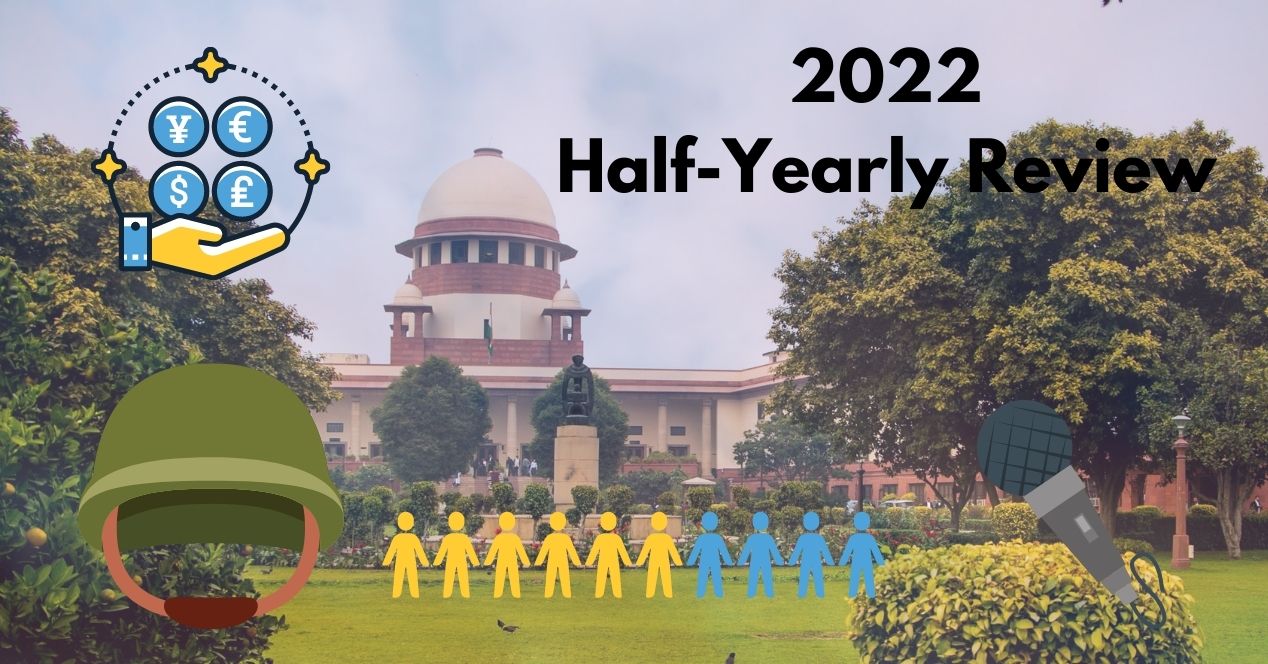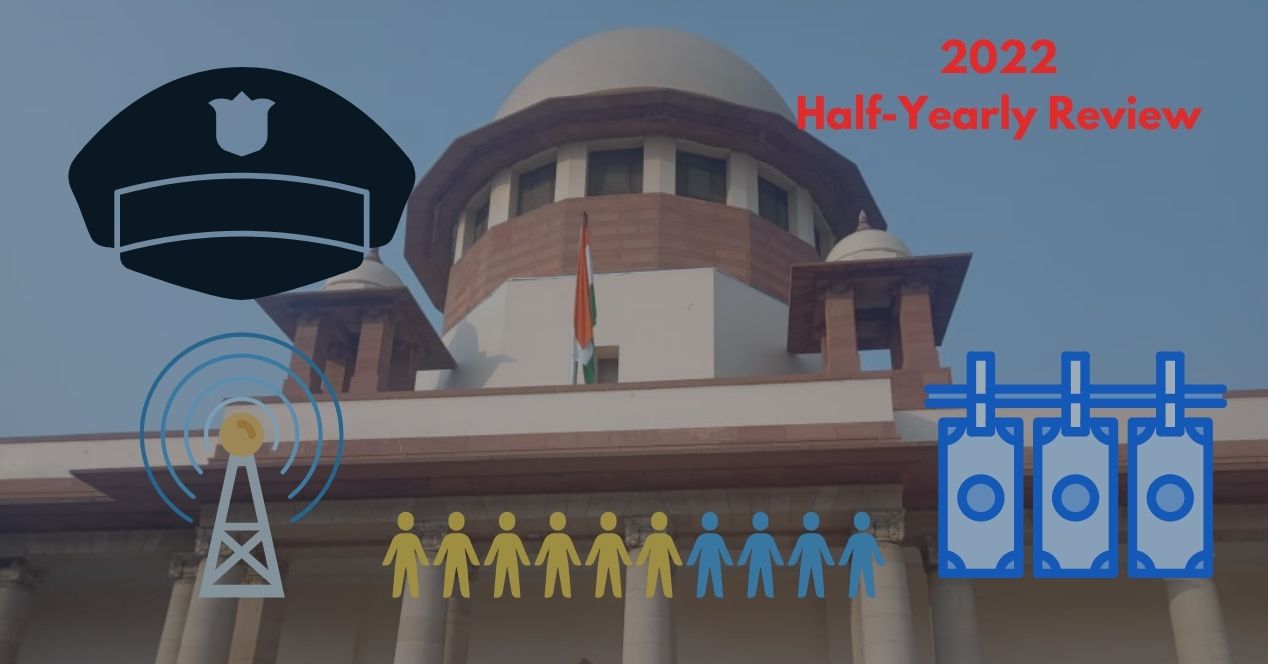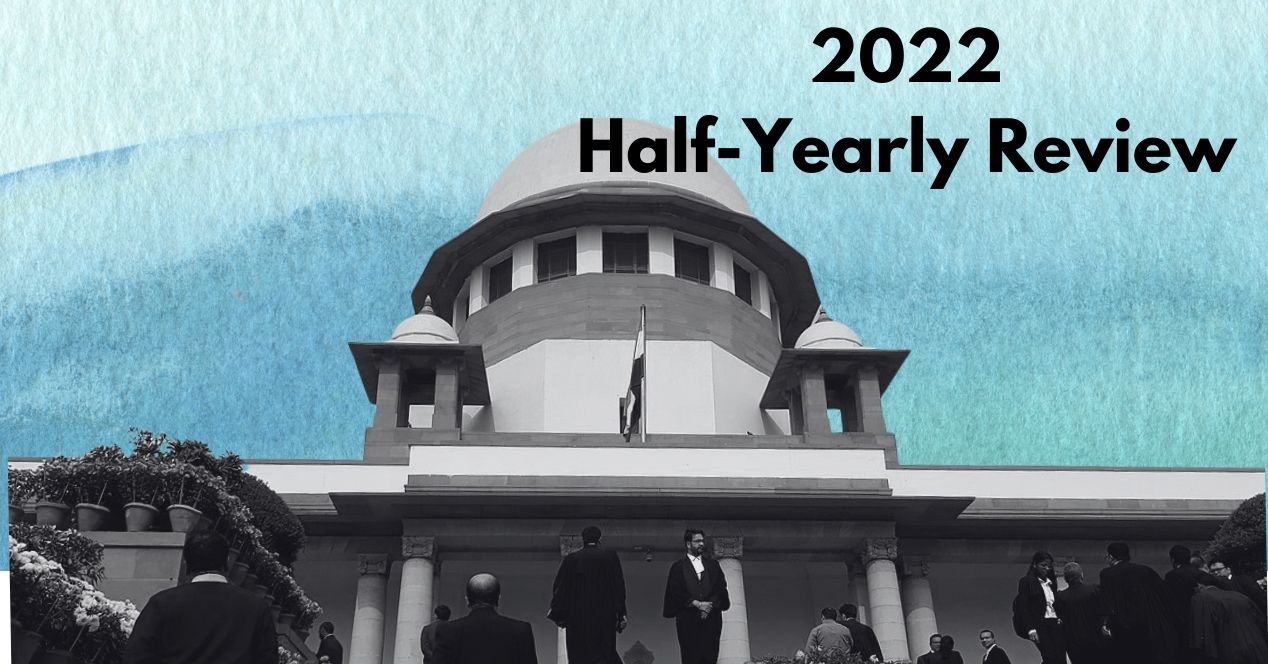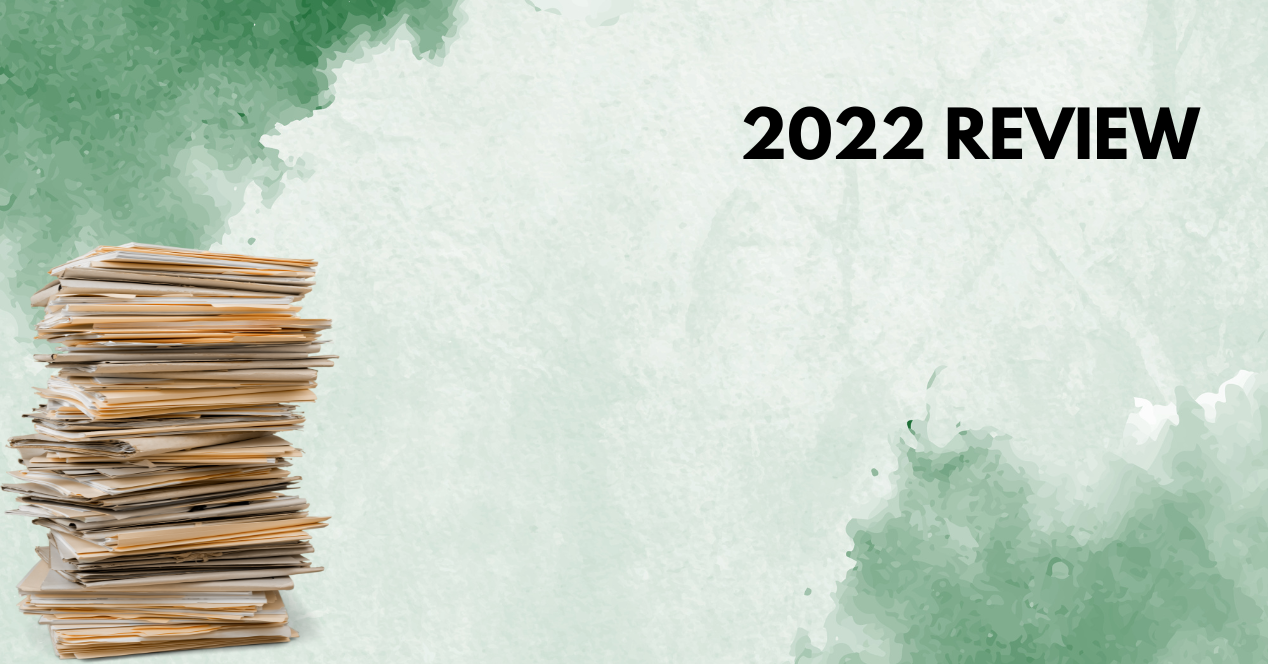Analysis
2022 Supreme Court Review: 10 Key Judgments
In 2022, the Supreme Court delivered important Judgments on reservations, religious freedoms, freedom of speech and more.
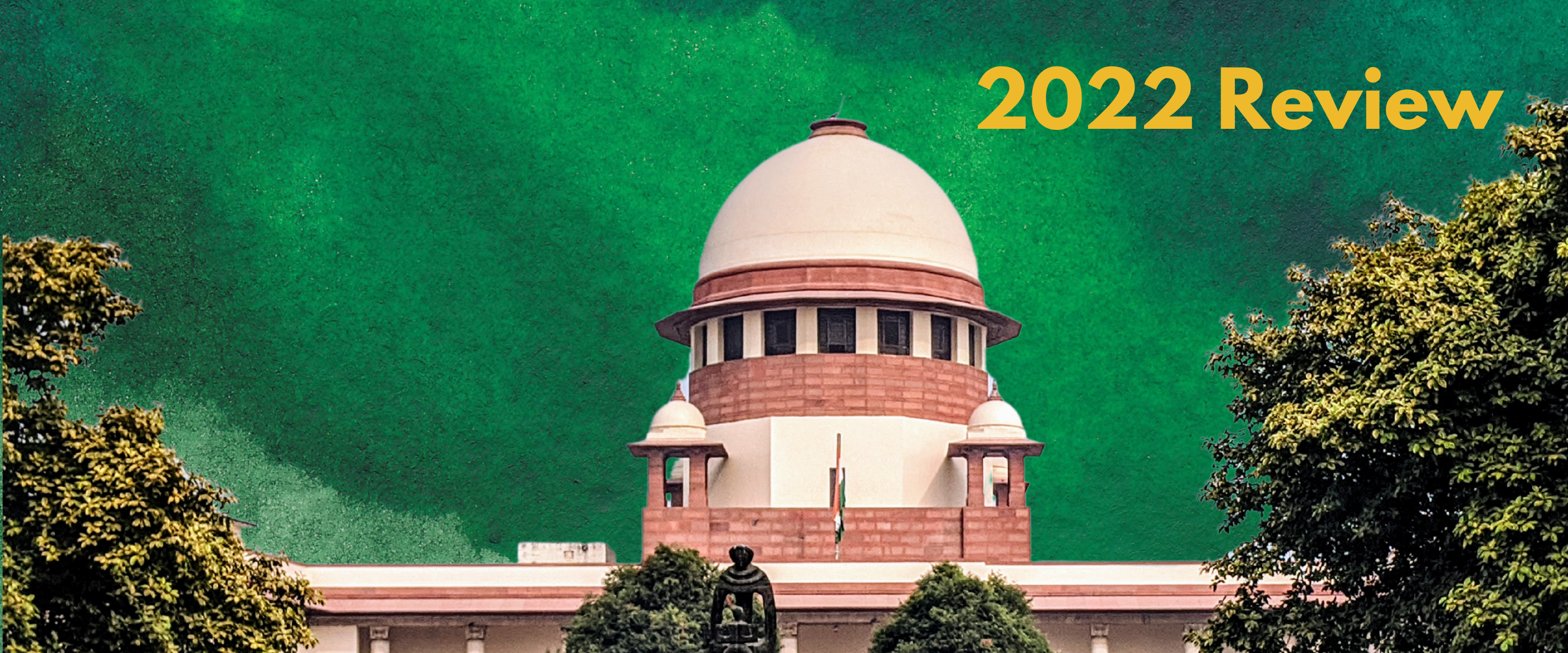
The Supreme Court delivered 1,263 Judgments in 2022. SCO reviews the 10 most important Judgments that impacted all of our daily lives.
The list includes cases concerning reservations, the powers of special investigation agencies, restrictions on receiving foreign contributions, the challenge to the law on sedition, students’ freedom of religion in educational institutions, pensions for army retirees, and the standard of evidence required to prosecute bribery cases against public officials.
#1 OBC Reservations Allowed in All India Quota in PG NEET Admissions (January 2022)
In July 2021, the National Testing Agency introduced reservations for Other Backward Classes (OBCs) and the newly recognised class of Economically Weaker Sections (EWS) within the All India Quota. Medical students and doctors challenged the notice allowing the reservations, stating that it crossed the 50% limit on reservations imposed by the SC in Indra Sawhney (1992). Further, they argued that the policy resulted in reverse discrimination against the pool of general-category students. General category doctors and students demanded that seats in postgraduate courses should be granted solely based on merit.
In the face of a looming Third Wave of the COVID-19 pandemic, on January 20th, 2022, Justices D.Y. Chandrachud and A.S. Bopanna allowed the reservations policy to apply for the 2021 batch as is, in Neil Aurelio Nunes v Union of India. In the same Order, they upheld OBC reservations within the AIQ, stating that reservations did not contradict merit and rejecting the petitioners’ attempts to frame them as opposing considerations during admissions. Merit, according to Justice Chandrachud, does not exist in a vacuum and is affected not only by the opportunities available to a person, but their cultural and social capital as well.
On the question of reservations for ‘Economically Weaker Sections’ (EWS) in PG NEET, the SC decided to hear the matter at a later time, as a larger Constitution Bench case was pending on the validity of reservations based on economic criteria. The Constitution Bench led by CJI U.U. Lalit upheld EWS reservations in November 2022. Now, the central question is whether the ₹8 lakh income limit is based on reliable data.
#2 States Continue to Seek Clarity on Reservations in Promotions (January 2022)
In 2006, the Supreme Court in M. Nagaraj v Union of India held that States are required to prove three conditions before providing reservations in promotions. First, they must show the backwardness of the class. Second, they must present data to prove that they are inadequately represented in the position or service where reservations are sought. Third, they must show that reservations are in the interest of administrative efficiency.
States, however, were unclear on how to achieve these conditions. Over 80 petitions have been filed by States asking the Court to clarify the meaning and method of proving ‘inadequate representation’ and ‘maintaining administrative efficiency’ as they continue to face issues when implementing schemes for reservations in promotions.
On January 28th, 2022, a Bench comprising Justices L.N. Rao, B.R. Gavai, and Sanjiv Khanna delivered the Judgment in Jarnail Singh v Lacchmi Narain Gupta, clarifying that the data collected to prove inadequate representation must use the ‘cadre’ as the unit. They further held that this data must be reviewed periodically. However, the Court held that the States must decide the period of this review and the criteria used to determine inadequate representation based on the data collected.
Despite the SC’s Judgement, the petitions from individual States seeking clarifications on the data required to implement their reservation policies remain pending. When the case was heard in February, Justices Rao and Gavai aired their concerns about the number of pending petitions and how they could possibly hear them. Even though Justice Rao expressed his intent to finish the hearings before his retirement in June 2022, very little progress has been made since the ‘clarificatory’ Judgment.
#3 Court Refused to Interfere with ‘One Rank One Pension’ Policy (March 2022)
In November 2015 the Union government claimed to fulfill a Bharatiya Janata Party key election promise—reviving the One Rank One Pension (OROP) policy after it was discontinued in 1973. The policy states that officers who retired after January 1st, 2014 would receive pensions based on their last drawn pay, whereas those who retired before this date would receive pensions based on the salary drawn by officers of their rank in 2013. These pensions are reviewed every five years.
Retired army officers challenged the policy at the Supreme Court in April 2017. They claimed that the review period discriminated against older retirees, who would receive lower pensions in comparison to younger retirees for those five years. They also claimed that the 2015 OROP policy was contrary to the policy that the Union had promised in 2014, which was agreeable to the pensioners.
In the cases of Indian Ex Servicement Movement v Union of India, a Bench comprising Justices D.Y. Chandrachud, Surya Kant, and Vikram Nath dismissed the case in favour of the Union on March 16th, 2022. They held that the policy was not discriminatory as the same understanding of OROP is applied to all retirees irrespective of the date of their retirement. They also held that the Union was not bound by their previous statements and the original understanding of OROP contained in the Koshyari Committee Report (2011). It is a matter of policy and the Union has the discretion to decide how it is implemented.
The OROP policy, as it stands, clears the way for additional defence spending in other areas of concern, such as military modernisation and weapon maintenance. Others have proposed that the government simply does not have the capability to take upon the logistical exercise of revising pensions for two million retirees every year. However, these justifications may come as the cost of goodwill from the soldiers themselves, who argue that the difference at the base salary level will only continue, even after the pensions are revised.
#4 Reservations for Vanniyar Community in Tamil Nadu Struck Down (March 2022)
In February 2021 the Tamil Nadu legislature passed an Act to provide reservations for the Vanniyar community within the reservations that were being provided for Most Backward Classes (MBC). This sub-classified category of Vanniyars would receive 10.5% of the 20% reservations provided to MBCs.
Other individuals from the MBC category challenged the Act, claiming that States did not have the power to identify classes for reservation. The Constitution (105th) Amendment, 2021, which granted States this power, was enacted six months after the Tamil Nadu Act was passed, in August 2021. MBC individuals also claimed that there was no empirical data to support the Vanniyar community’s claim for reservation. The Tamil Nadu government responded that they had the power to make classifications within the MBC category. The percentage of reservations provided to Vanniyars was proportional to their population.
On March 31st, 2022, Justices L.N. Rao and B.R. Gavai declared the Act and the reservations unconstitutional in Pattali Matkal Katchi v Mayileruperimal. They agreed with the State government’s position that they did not identify a new class, but merely re-allocated seats through further sub-classification within MBC reservations. However, they held that this sub-classification must be based on reliable data which the Tamil Nadu government failed to do. The Bench refused to acknowledge reservations that only used relative population as a basis, instead of comparing the backwardness of Vanniyars to other MBC groups.
The Bench’s acceptance of the sub-classification argument shines a light on the different stances within the SC on the issue. In August 2022, CJI Ramana was reluctant to accept the Madiga community’s request for reservation through sub-classification, as the constitutionality of sub-classification is the central question before a pending 7-Judge Bench.
#5 Additional Restrictions on Foreign Contributions to NGOs Upheld (April 2022)
In September 2020, Parliament enacted an Amendment to the Foreign Contributions (Regulation) Act, 2010 (FCRA). The Amendment barred the transfer of foreign funds to other organisations and individuals, strictly limited the funds that could be used for administrative purposes, and mandated that all funds could only be received at the main branch of the State Bank of India in New Delhi.
Multiple Non-Governmental Organisations (NGOs) challenged the amendment, arguing that it had a devastating impact on NGOs that receive foreign funds, as well as smaller NGOs that rely on larger organisations for funding. The Union responded that these restrictions were necessary to trace the flow of foreign money and ensure that national interest and security were maintained.
Justices A.M. Khanwilkar, Dinesh Maheshwari, and C.T. Ravikumar upheld the 2020 FCRA Amendment on April 8th, 2022 in Noel Harper v Union of India. The SC agreed with the Union that the restrictions ensure foreign funds are used solely for permitted purposes.
The NGOs that will feel the brunt of this decision are likely smaller, grassroots organisations that rely on funds from larger organisations to stay afloat. Dr. Ingrid Srinath, Director of Centre for Social Impact and Philanthropy, spoke to SCO and explained that these smaller organisations ‘…lack the wherewithal to access international donors directly.’
The limitations placed on the funds that may be utilised for administrative expenses also hamper ground-level functioning according to Dr. Srinath. ‘You cannot run a field programme without layers of supervision, management, policy design, and strategy—especially if you are a think tank, or a campaigning or advocacy foundation.’ By forcing them to solely fund these activities through domestic contributions, the Amendments makes it ‘…near impossible for certain types of work to happen at all.’
The facts put forth by the Union—and accepted by the Supreme Court—have also been heavily disputed. During the hearings, the Union pointed to the 19,000 FCRA license cancellations between 2010 and 2019 to show there is rampant misuse of funds and a need for further restrictions. However, lawyers like Aditya Shrivastava claim that a majority of these cancellations were due to technical lapses. There is also a lack of publicly available data that proves the Union’s claims of fund misuse, raising the question of whether the restrictions on NGOs remain vastly disproportionate.
#6 SC Hit Pause on the Sedition Law (May 2022)
In February 2021, Journalists Kishore Wangkhemcha and Kanhaiya Lal Shukla became the first of a host of petitioners in the latest attempt to challenge the law on sedition under Section 124 A of the Indian Penal Code, 1860. Their challenge focused on the colonial roots of the law—used as a tool to quell dissent by the British Empire. They claimed that the vague wording of Section 124A allowed its continued use to curb free speech.
The Supreme Court began hearing the challenge in S.G. Vombatkere v Union of India in earnest in May 2022. After briefly considering whether to refer the case to a 7-Judge Bench, the Bench comprising CJI Ramana and Justices was placated by the Union government. Solicitor General of India, Mr. Tushar Mehta convinced the Court that as a part of Aazadi Ka Amrit Mahotsav, the Union would re-examine and shed India’s ‘colonial baggage’ by re-examining the law.
In the meantime, the Bench delivered an Order on May 11th stating that no fresh cases can be filed under Section 124A. Further, all pending trials that include charges under the provisions can proceed on the basis of other alleged offences that aren’t sedition.
While this Order does represent the most progress made towards striking down the antiquated law since 1950, there are still some significant caveats. The Bench directed the Union to return with a status update in July 2022, amidst concerns that the Union was merely delaying the case further. The Union, however, only gave an update in October 2022 when Attorney General R. Venkataramani said the law would ‘probably’ be reconsidered during the winter session of Parliament. Meanwhile, the Interim Order will remain in effect.
#7 Challenged Provisions in the Prevention of Money Laundering Act Upheld (July 2022)
Over 80 petitions were filed at the Supreme Court challenging the wide powers of investigation granted to the Enforcement Directorate (ED) under the Prevention of Money Laundering Act, 2002 (PMLA).
The petitioners, including several politicians accused of money laundering, claimed that the ED has wide powers of arrest and to seize property, without being bound by the rules of the Criminal Procedure Code, 1973 (CrPC). Additionally, they challenged the onerous bail conditions under the PMLA. Section 45 reverses the criminal law standard of ‘innocent until proven guilty’, which places the burden on the prosecution to prove the accused persons guilt. Instead, the PMLA requires the accused to prove that they are not guilty before they can receive bail.
The Union government claimed these onerous conditions were necessary to deal with a crime as serious as money laundering. The CrPC must not apply in instances of money laundering which have a greater risk of accused persons destroying evidence.
On July 27th, 2022, Justices A.M Khanwilkar, Dinesh Maheswari, and C.T. Ravikumar agreed with the Union government and upheld all the challenged provisions of the PMLA in Vijay Madanlal Choudhary v Union of India. They held that the ED did not possess police powers and, as a result, did not have to follow police procedure when conducting an inquiry. Further, the reversed burden of proof to receive bail was justified in order to counter the ‘heinous’ crime of money laundering.
The Judgment viewed in the context of a meteoric rise in the number of cases filed under the PMLA—from 209 in 2014 to 3,985 cases in 2021—paints a dire picture. Speaking to SCO, advocate Arshdeep Singh Khurana claimed it is nearly impossible to get bail, which raises concerns that the ED is being used as a political instrument. Persons charged under the PMLA include a large group of opposition party members such as Mr. Rahul Gandhi and Ms. Sonia Gandhi (Congress), Mr. Satyendar Jain (AAP), and Mr. Sharad Pawar (Shiv Sena).
#8 Hijab Ban Challenge Ended in Split Verdict, To Be Referred to Larger Bench (October 2022)
On March 15th, 2022, the Karnataka HC upheld the State government’s Hijab ban in educational institutions. On the same day, the All India Muslim Personal Law Board filed a petition challenging the decision at the SC. The case of Aishat Shifa v State of Karnataka (2022) was placed before a Bench composed of Justices Hemant Gupta and Sudhanshu Dhulia.
The Bench heard arguments in the case over nine days from September 5th to September 21st, 2022. The petitioners presented a wide variety of arguments. They claimed that the ban amounted to indirect discrimination against Muslim girls, and violated their Right to Education. The Karnataka government argued that the ban furthers the Right to Equality by ensuring uniformity among students.
On October 13th, 2022, the Bench delivered a split decision in the case. Justice Hemant Gupta upheld the ban, stating that the ban was religiously neutral as it applied equally to all students, and students were hindering their own Right to Education by violating it. The State itself was not denying access in any manner.
Justice Sudhanshu Dhulia on the other hand held that the ban should be struck down. He held that there was no justifiable reason for banning Hijab in the classroom and that religious beliefs should be reasonably accommodated by educational institutions. As the case resulted in a split verdict, it is now up to CJI Chandrachud to place it before a larger Bench for a final decision.
Many of the core issues that arose during the case will have to be relayed and decided once again. The parties and the Bench all agreed that the question of whether wearing the hijab is an essential religious practice (ERP) should not be a consideration in this case. Yet, ERP dominated the hearings at the Supreme Court. Will the new Bench continue to focus on ERP? If not, the focus of the case may fall squarely on Muslim women students’ rights to freedom of speech, expression, religion, and education.
#9 Constitution Bench Upheld Reservations Based on Economic Criteria (November 2022)
In January 2019, Parliament enacted the Constitution (103rd) Amendment Act, introducing reservations for ‘Economically Weaker Sections’ (EWS). The Amendment allowed States to provide up to 10% reservations in educational institutions and public employment on the basis of economic criteria alone. Further, it excluded those who are already benefiting from reservations, such as Scheduled Castes (SCs), Scheduled Tribes (STs), and Other Backward Classes (OBCs).
EWS reservations were upheld by a 3:2 majority in Janhit Abhiyan v Union of India on November 7th, 2022. Justices Maheshwari, Trivedi, and Pardiwala formed the majority and upheld the Amendment, stating that there is no active exclusion—the Amendment merely creates a new class of beneficiaries within the general category. Further, they saw no issue with economic considerations being the sole criteria for reservations.
Justice Ravindra Bhat wrote the dissenting opinion for himself and the outgoing CJI Lalit. They did not object to solely using economic criteria, but they claimed that the exclusion of SCs/STs/OBCs violated the Right to Equality. The fact that they already benefit from existing reservations has no connection with the purpose of EWS reservations—addressing income inequalities between individuals.
The Judgment marks a monumental change in the Court’s understanding of reservation and affirmative action policies. It cements a shift from reservation as a means to address historic and structural disadvantages experienced by certain classes of people, based on factors like caste and religion, to a means to address inequalities between individuals.
#10 SC Upholds Validity of Circumstantial Evidence to Convict Public Officials of Bribery (December 2022)
In April 2000 a Lower Division Clerk solicited a bribe from Mr. Rajvit Singh Sethi for the purpose of installing an electricity meter in his shop. He filed a complaint which resulted in being caught in the act and subsequently arrested. The complainant passed away shortly before the trial could begin. Despite the loss of the primary witness and the only source of direct evidence in the case, the Trial Court convicted the accused, Ms. Neeraj Dutta, under the Prevention of Corruption Act, 1988.
The case of Neeraj Dutta v State (Govt of NCT Delhi) (2022)reached the Supreme Court on appeal in 2009 on the grounds that there was insufficient evidence, and was referred to a Constitution Bench in 2019. On December 15th, 2022, a 5-Judge Bench led by Justice Abdul Nazeer unanimously held that public officials can be convicted of bribery or ‘illegal gratification’ based on circumstantial evidence. The passing away of the primary witness would not affect the case, if circumstantial evidence was strong.
In January 2022, Transparency International released a report ranking 180 countries by their perceived level of corruption by citizens. India ranked 85th in this report. The Judgment, authored by Justice B.V. Nagarathna, may have a cascading effect on corruption in similar cases. Over time, this may have a positive effect on reducing corruption in the country.

